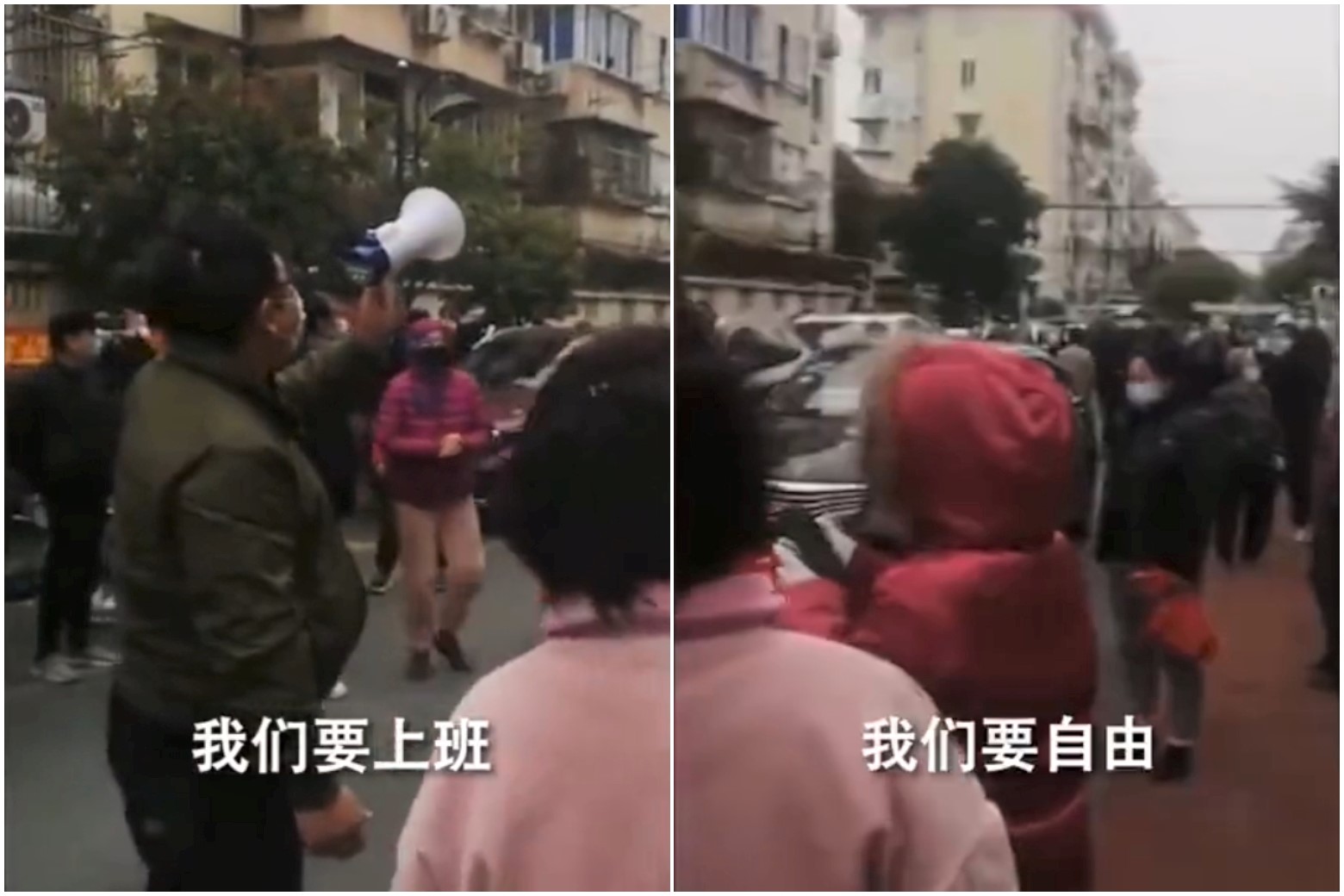China censors Shanghai protest videos as Covid-19 lockdown anger grows
Sign up now: Get ST's newsletters delivered to your inbox

A rare protest at a Shanghai housing compound started trending on WeChat.
PHOTOS: SCREENGRABS FROM TWITTER
Follow topic:
BEIJING (BLOOMBERG) - China is struggling to manage growing public unhappiness over tough Covid-Zero measures in Shanghai, one of its wealthiest and most globalised cities, as some residents revolt against lockdown orders which have stretched in some instances to a month.
Tech giant Tencent Holdings took down two videos earlier this week of a rare protest at a Shanghai housing compound after they started trending on the company's WeChat microblogging and video publishing platforms, according to a person familiar with the matter.
The videos had been posted by users to their WeChat timelines, the person said.
In the footage viewed and independently verified by Bloomberg News, dozens of residents behind the gates of the Jiangnan Xinyuan housing estate in Shanghai's Minhang district chant phrases including "we want to eat", "we want the right to know", and "we want freedom".
People there have been confined to their homes since March 2 and residents have undergone more than 10 rounds of mass virus testing, according to official notices from the compound's WeChat account.
Tencent told its employees the videos were taken down because they violated China's laws and policies, said the person, asking not to be identified due to fear of reprisal.
A third video of the compound's residents demonstrating, where the chanting is less clear, and does not include terms such as "freedom", has been allowed to remain online, the person said.
The ramped-up censorship reflects China's growing dilemma over its zero-tolerance approach to the virus, which is extracting greater economic and social costs while leaving it isolated in a world that has chosen to live with Covid-19.
Shanghai's outbreak has ballooned to more than 32,000 cases in the past month, the biggest spread of infection in China since the novel coronavirus was first detected in Wuhan, the capital of central China's Hubei province.
While officials have shown greater flexibility with the Covid-Zero policy in recent months - creating closed loop systems for businesses and factories to keep operating amid lockdowns and in the case of Shanghai, alternating lockdowns between its eastern and western halves - the pushback in China's financial hub underscores the domestic costs of practising the policy indefinitely.
A Tencent company representative declined to comment while the Shanghai city government's news office did not immediately respond to a request for comment.
Frustration and anger are palpable from posts on major social media platforms about Shanghai's Covid-19 control policies, with tens of thousands of users complaining about running out of food or criticising the government for failing to provide timely medical care to those in need.
One user posted on Weibo photos of what appeared to be a rally at another housing compound on Wednesday (March 30), saying that residents were protesting against a lack of food supplies.
A topic on Weibo about an elderly person who died of asthma after ambulances refused to take him to a hospital in Shanghai attracted more than 55 million views and 23,000 posts on Thursday alone, with posts lamenting the state of medical care more than two years into the pandemic.
While not citywide like elsewhere in China, the lockdowns in Shanghai have led to desperation among those with chronic conditions such as kidney failure in incidents which evoke the traumatic scenes of early 2020 when the virus first emerged.
Before this week's split lockdown, officials had been sealing individual buildings and housing compounds for compulsory testing, to root out suspected virus cases.
Shanghai, a city that accounts for 3.8 per cent of China's gross domestic product, is home to many of the country's elite in industries ranging from financial services to luxury fashion.
More foreigners live there than anywhere else in China and the quality of health-care is considered the best nationwide.
With no major outbreak in the past two years, residents there are also unaccustomed to China's strict Covid-Zero playbook.
City officials issued an open letter on Thursday thanking residents for bearing with the measures and vowing to do better to manage emergency care and food supply.
Some 71 million people in China are either in lockdown or facing one imminently, according to Bloomberg calculations. Affected households often find themselves with inadequate access to food, as panic buying and a lack of delivery staff contribute to shortages.
Lockdowns are likely costing the country at least US$46 billion (S$62 billion) a month, or 3.1 per cent of GDP, in lost economic output, according to an estimate by scholars at the Chinese University of Hong Kong.
WeChat has also deleted an article which highlights the mounting human cost of the Covid-Zero policy, written by Mr Li Chengpeng, a well-known critic of government policies, said China Digital Times, an independent media outlet which tracks online censorship in China. Posts that carry the full article were also scrubbed from Weibo, controlled by Sina Corp.
China has a sophisticated censorship system where its propaganda department issues regular guidance on what media organisations and social media platforms need to police. The Great Firewall bars access for citizens to most foreign news sites and platforms such as Google and Facebook, unless they use a virtual private network.

